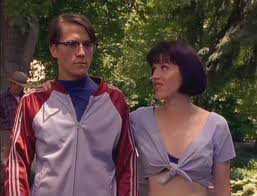I recently wrote a post about Harold Lauder, a character from Stephen King’s The Stand. I mentioned that Harold has a thing called “Nice Guy Syndrome.”
One criticism of that post came from a man who complained, “Can’t be nice, can’t be a jerk! It’s tough being a male!”
I’m truly sorry if anyone else got the vibe from my last post that I don’t like nice guys. That wasn’t my intent. In fact, I love nice guys. I’m dating one. I appreciate any man who goes out of his way to be kind to others. I am not talking about those men when I talk about men with Nice Guy Syndrome.
Because men with Nice Guy Syndrome are NOT nice guys.
Here’s why:
Being “nice” just to get something isn’t really nice: A man with Nice Guy Syndrome will go out of his way for his “lady fair. He will rush to her side when she’s sad, listen to her problems, and let her cry on his shoulder.
But when she starts dating someone else, what happens? The man with Nice Guy Syndrome complains about being stuck in the “friend zone.” He may even become hostile, referring to her as a bitch, or a whore, or more likely he will insult her intelligence, calling her an idiot for not picking him.
We see that his niceness was not his nature, but was simply a means to an end.
Men who are only nice until a woman turns them down aren’t nice guys. They’re just manipulative Harold Lauders, hiding their true colors in order to receive their reward (note: you can often diagnose Nice Guy Syndrome early on by paying attention to the way a man treats others besides his object of affection–does he respect other women? How about men? Or is he only “nice” to one woman?)
Objectifying women isn’t really nice: Men with Nice Guy Syndrome act as if the world is a vending machine that trades niceness for women. If they are nice and don’t end up with a woman, they feel that they have been cheated.
A man with Nice Guy Syndrome feels that his niceness should entitle him to a relationship in the same way that a man who goes to a prostitute feels that his money should entitle him to sex. A man with Nice Guy Syndrome doesn’t view women as complex human beings. He views them as objects with a price tag, so naturally he is frustrated when he learns that his niceness cannot be used as currency to buy a relationship.
Invalidating a woman’s choice isn’t really nice: A man with Nice Guy Syndrome is quick to judge any other man that his love interest starts dating. He will become skeptical and over-protective. He will speedily label the other man a jerk, and will tell his friends that the girl is stupid for dating him.
Rather than allowing the woman to make her own decisions, he treats her as a foolish child.
Blaming women for being stuck in abusive relationships isn’t really nice: Now, sometimes women really do end up in relationships with jerks. Unfortunately, this happens all too often. But does the reality of domestic abuse excuse the actions of the “nice guy?”
No.
A man with Nice Guy Syndrome ridicules, with an “I told you so” manner, the women who end up in these abusive relationships. All other factors are ignored in favor of a “You could have had me, but you picked him. You deserve what you got and I’m going to sit back an laugh” mindset.
Never mind the complex, crippling problems that keep women in abusive relationships. Never mind the fact that the jerk the woman is dating likely started out as a “nice guy” too…
Contributing to rape culture isn’t really nice: At the center of rape culture is the idea that a woman’s (or a man’s) “No” should not be taken seriously. If she consents to some things, or if she sends certain “signals,” a man can assume that he is free to sleep with her, regardless of her opinion on the matter.
A man with Nice Guy Syndrome, even if he does not rape a woman, is participating in rape culture when he repeatedly pursues a woman who has turned him down. He does not take “No” for answer, and will not back off once he is rejected because he feels that her friendship with him should eventually entitle him to a relationship. He accuses the woman of leading him on, even if she has made her feelings toward him clear. He may even stalk her or publicly humiliate her.
Men with Nice Guy Syndrome are products of and participants in rape culture. Like Harold Lauder of The Stand, they can even be dangerous–becoming hostile and abusive toward women who do not return their affections or toward men who “steal” their women. They are manipulative men who objectify and feel entitled to women–who think that women can be bought with a price.
Men with Nice Guy Syndrome are NOT nice guys.

